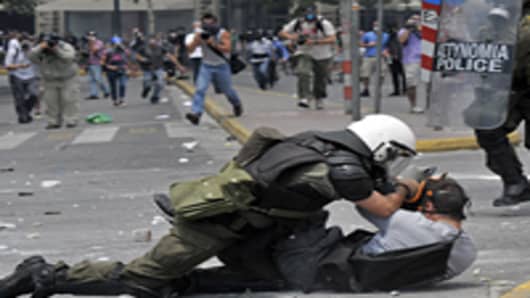The situation facing European countries like Greece and Portugal is directly comparable to the economic crisis which hit Latin America in the late 1990s, Andy Brough, co-head of Schroders’ Pan European Small and Mid Cap team, told CNBC Wednesday.
"I get the feeling we're having an Argentinean re-run," Brough said. "In Europe, they've tried everything to sustain the system but it's unsustainable."
Argentina, together with the region's largest country Brazil and with Uruguay, suffered a sustained economic crisis last decade after building up a huge debt pile.
Argentina in particular continued to borrow heavily from the International Monetary Fund (IMF) without repaying its debts.
"In the end the populace is going to say we didn't go into the euro for this," the Schroders fund manager said.
Fernando de la Rúa, then president of Argentina, had to flee the country in a helicopter after the unrest grew. While the political situation in Greece and Portugal is not yet that serious, there have been widespread protests on the streets of Athens against austerity measures demanded by the ECB and IMF as part of a second bailout of Greece.
Evangelos Venizelos, who was brought in as Finance Minister of Greece just two weeks ago, told CNBC in his first international broadcast interview Tuesdaythat Greece's part in the euro zone was "not reversible". He insisted that "the common will of our people" was behind staying in the euro zone.
More doubt was cast on Portugal's ability to withstand its economic problems on Tuesday after ratings agency Moody's downgraded its government debt, citing growing risks the country will require a second rescue package because it cannot meet its debt reduction targets.
It may be even more difficult for Greece and the banks supporting it to recover from its economic problems than it was for Argentina and Brazil, according to Brough.
"If you look back then, we didn't have the transparency we do now, so all the banks that were funding Latin America could smooth over what was going on," he said. "Now, everyone is in the spotlight so it's much harder for banks to smooth it over."
"The middle class in Argentina couldn't just withdraw their money, whereas the middle class in Greece or Portugal can take it out and buy anything that isn't the euro," Brough added.
In Argentina, the government slapped a $250 a week limit on withdrawals from its banks to halt massive pulling out of savings.



